Select Language
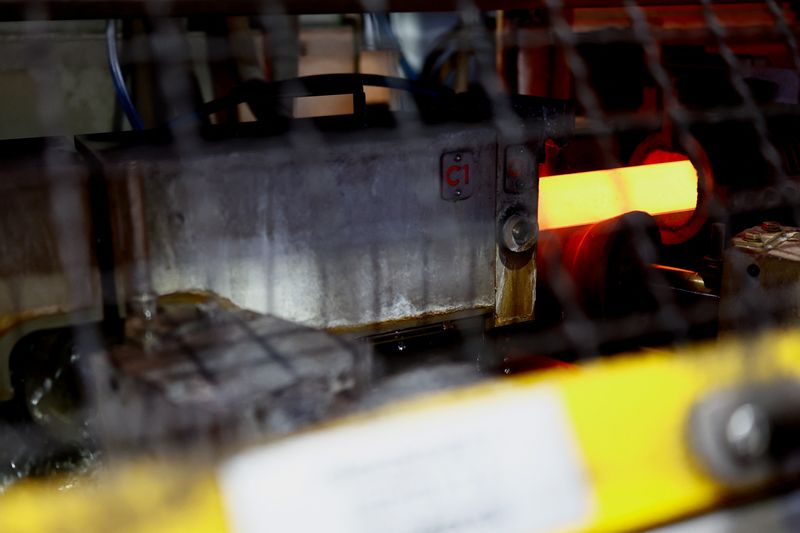
By Maria Martinez
(Reuters) -German industrial orders fell unexpectedly in November, sapped by a decline in large orders, showing that a recovery in the industrial sector is not in sight.
Industrial orders declined by 5.4% on the previous month on a seasonally and calendar adjusted basis, the federal statistics office said on Wednesday. Analysts polled by Reuters had forecast no change.
Excluding large orders, orders were 0.2% higher than the previous month, the statistics office said.
In a less volatile three-month comparison, incoming orders between September and November were 1.7% higher than the previous three months.
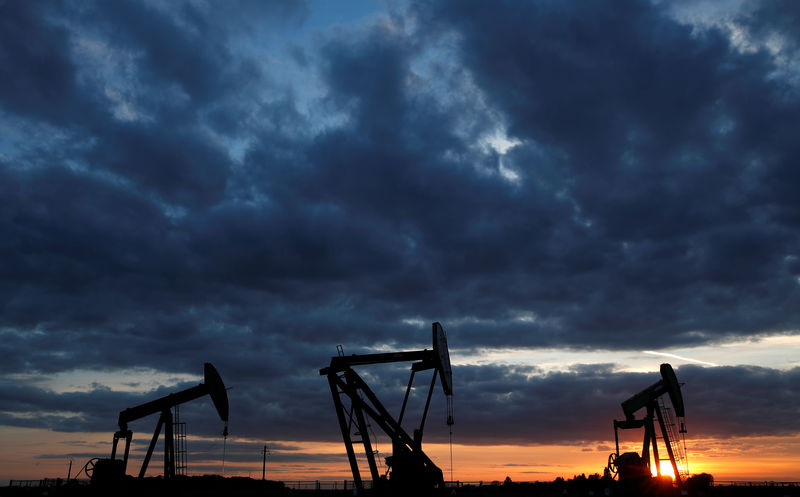
nvesting.com-- Oil prices rose in Asian trade on Wednesday, extending a bounce from the prior session as U.S. industry data pointed to a drop in oil inventories, while production by OPEC countries was seen falling.
Prices gained some ground this week amid persistent signs of strength in the U.S. economy, while traders bet that cold weather in the U.S. and Europe will buoy demand.
Brent oil futures expiring in March rose 0.5% to $77.41 a barrel, while West Texas Intermediate crude futures rose 0.5% to $73.97 a barrel by 20:37 ET (01:37 GMT). Both contracts were close to their highest levels since mid-October.
US inventories shrink sharply- API
Data from the American Petroleum Institute showed on Tuesday that U.S. oil inventories shrank by more than 4 million barrels in the week to January 3, substantially more than expectations for a draw of 250,000 barrels.
The reading marked a second straight week of draws for inventories, as the world’s biggest fuel consumer saw increased travel during the year-end holiday season. Cold weather in the country, stemming from a polar vortex, is also expected to spur demand for distillates, especially heating oil.
The API data usually heralds a similar reading from government inventory data, which is due later on Wednesday.
Shrinking inventories herald tighter oil supplies in the U.S., and also signal healthy demand in the country.
OPEC output seen dropping December
Data from Reuters showed oil production by countries in the Organization of Petroleum Exporting Countries fell in December, with maintenance activity in the United Arab Emirates offsetting a production hike in Nigeria.
Bloomberg data showed Russia’s oil production fell below its 8.978 million barrels per day target in December.
The OPEC and its allies had pushed forward plans to begin increasing production until at least the second quarter of 2025, amid persistent weakness in oil prices.
Concerns over slowing demand in China and strong production outside the OPEC had weighed on oil prices, as had recent strength in the dollar.
Oil prices lost about 3% in 2024.
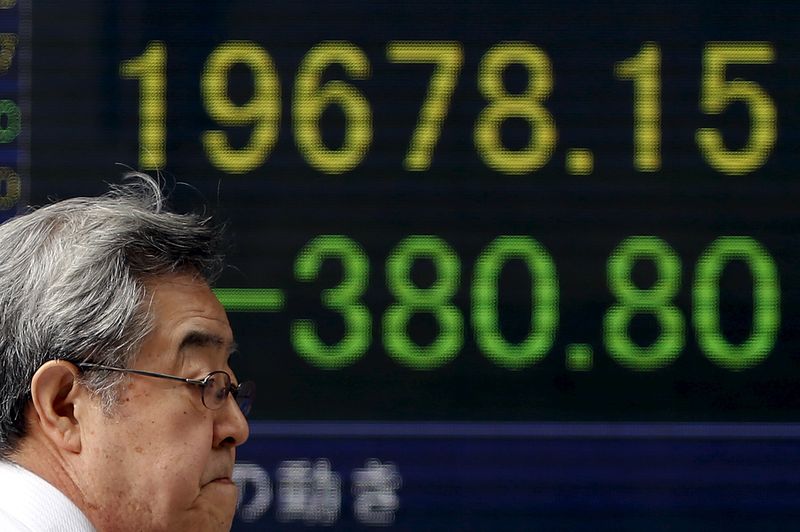
Investing.com-- Asian stocks were a mixed bag on Wednesday, with Chinese markets seeing sustained losses after the U.S. added more major firms to a blacklist, while Japanese markets fell after government officials warned of intervention in the currency market.
Regional markets showed some resilience in the face of a negative lead-in from Wall Street, as a mix of technology stock losses and anxiety over interest rates battered U.S. stock benchmarks on Tuesday.
Losses in NVIDIA Corporation (NASDAQ:NVDA) were the biggest weight on Wall Street, as a flurry of new products from the company failed to lift its share price.
Wall Street futures were marginally higher in Asian trade on Wednesday.
South Korean stocks were an outlier, with the KOSPI rising 1.1%. Samsung Electronics Co Ltd (KS:005930), the biggest stock on the index, rose 2.7% even as its fourth-quarter earnings missed expectations by a wide margin.
Australia’s ASX 200 rose 0.6% as consumer price index data showed inflation grew more than expected in November. But a mild decline in underlying inflation spurred bets that the Reserve Bank of Australia will cut interest rates sooner, rather than later.
Singapore’s Straits Times index rose 0.4%, while futures for India’s Nifty 50 index pointed to a positive open, before a barrage of major earnings due in the coming days.
While Asian stocks saw some gains this week, they were still nursing a weak start to 2025 amid growing uncertainty over U.S. interest rates and policy under incoming President Donald Trump.
Chinese stocks extend losses after US adds more firms to blacklist
China’s Shanghai Shenzhen CSI 300 and Shanghai Composite indexes fell about 0.8% each, while Hong Kong’s Hang Seng index shed 0.9%.
Chinese officials lambasted the U.S. government’s decision earlier this week to add technology giant Tencent Holdings Ltd (HK:0700) and Tesla Inc (NASDAQ:TSLA) battery maker Contemporary Amperex Technology (SZ:300750) to a blacklist of firms with ties to the U.S. military.
The move stands to further sour ties between the world’s largest economies, and comes as incoming Trump prepares to impose steep trade tariffs on the country.
Trump had denied reports earlier this week that his administration will impose less strict tariffs than initially signaled.
Among individual movers, BYD (HK:1211) fell more than 2% in Hong Kong trade after Reuters reported that the firm will be fined for allegedly violating labor laws at a factory in Brazil.
Japanese stocks fall on yen warning
Japan’s Nikkei 225 index fell 0.3%, while the TOPIX shed 0.8% after both indexes clocked strong gains in the prior session.
Local markets were spooked by government officials warning that further weakness in the yen could invite currency market intervention. The yen slid to a near six-month low this week.
Any intervention is likely to spark a sharp recovery in the yen, which in turn could pressure Japanese exporters, which make up a bulk of the Nikkei’s weightage.
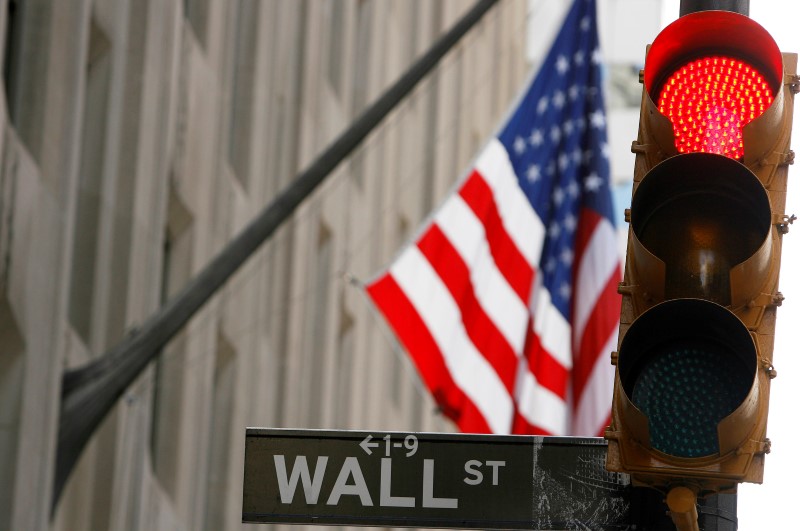
Investing.com-- U.S. stock index futures moved little on Tuesday evening, steadying after growing uncertainty over slower interest rate cuts and steep losses in Nvidia weighed heavily on Wall Street.
Losses in NVIDIA Corporation (NASDAQ:NVDA) pressured the broader technology sector, as did a spike in Treasury yields after economic data pointed to sustained inflationary pressures, furthering the case for a slower pace of monetary easing by the Federal Reserve.
S&P 500 Futures fell 0.1% to 5,950.75 points, while Nasdaq 100 Futures steadied at 21,358.50 points by 18:16 ET (23:1 GMT). Dow Jones Futures fell slightly to 42,778.0 points.
Nvidia slides after Huang speaks at CES 2025
Nvidia was by far the worst performing major technology stock on Tuesday, sliding 6.2% from record highs. The stock rose marginally in aftermarket trade.
CEO Jensen Huang unveiled a flurry of new products at the Consumer Electronics Show in Las Vegas on Monday, including a new range of graphics chips, in-house artificial intelligence models, more tie-ups with automakers on self-driving, and even a desktop supercomputer. Huang also said the firm’s next generation of Blackwell AI chips were now in full production.
But while the update does bode well for Nvidia’s long-term prospects, some analysts noted that it did little to spur the company’s near-term outlook.
A bulk of the announcement also appeared to be priced into the stock, given that it hit a series of record highs in the run-up to Huang’s address.
The stock was walloped by a heavy dose of profit-taking, after Nvidia tripled in market value through 2024.
Other major technology stocks also retreated, with Apple Inc (NASDAQ:AAPL) losing over 1% after the stock was slapped with its second sell rating in three months. Tesla Inc (NASDAQ:TSLA) slid 4.1% after BofA downgraded the stock on concerns over stretched valuations and potential difficulties in meeting its lofty AI ambitions.
Wall St spooked by inflation, rate jitters
Wall Street indexes slid on Tuesday, pressured by a spike in Treasury yields as stronger-than-expected job openings data pointed to persistent strength in the labor market.
Stronger-than-expected purchasing managers index data also pushed up concerns over sticky inflation.
Sticky inflation and strength in the labor market are expected to give the Fed less impetus to cut interest rates sharply in 2025, with the bank having warned as much during its December meeting.
Fed officials reiterated this stance over the weekend, further rattling investor sentiment.
Focus this week is squarely on nonfarm payrolls data for December, due on Friday, for more cues on interest rates.
The S&P 500 fell 1.1% to 5,909.50 points, while the NASDAQ Composite slid 1.9% to 19,491.65 points on Tuesday. The Dow Jones Industrial Average fell 0.4% to 42,529.28 points.
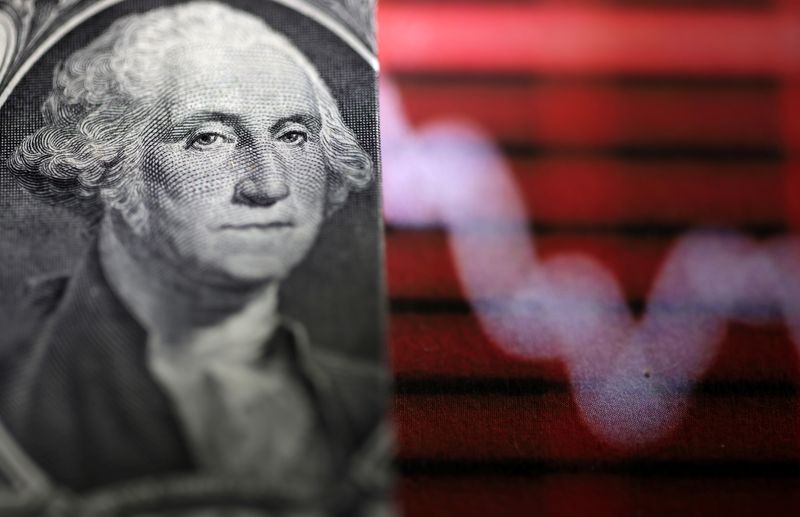
By Jamie McGeever
ORLANDO, Florida (Reuters) -U.S. financial markets last year were more sensitive to economic surprises than usual, and as Donald Trump prepares to begin his second term as U.S. president investors should buckle up for more of the same in 2025.
Especially in Treasuries.
The 10-year yield's sensitivity to inflation and activity data surprises last year was the highest in more than 20 years, according to Goldman Sachs. Although inflation has fallen, growth fears have ebbed, and the Federal Reserve has started cutting interest rates, these sensitivities persist.
Again, especially in Treasuries.
While equities' sensitivity to inflation surprises has fallen as price pressures have cooled, it remains high by historical standards. And stocks' sensitivity to growth surprises, though still modest, has begun to tick up to near pandemic-era levels.
What does this mean for the coming year? While benchmark gauges of implied equity and bond volatility are muted, markets are in a more tenuous position than they were a year ago. By many measures, such as pricing, sentiment and valuations, they are extremely stretched.
U.S. stocks have never been riding higher or represented a bigger share of the global market cap, and the Fed's 100 basis points of interest rate cuts since September have been met with a counterintuitive 100-basis-point rise in the 10-year Treasury yield.
Does this mean America's key markets are primed for correction? Maybe. But what's easier to say with confidence is that we're going to see wider intra-day trading ranges and short-term reversals as investors contend with the biggest wild card of all: Trump's agenda.
'VOLATILITY MAN'
History shows there is a "solid" relationship between macro and market volatility, as Citi's Stuart Kaiser points out. And with the world still in the dark as to how Trump's trade and tariff policies will pan out and how the Fed will respond, macro uncertainty is alive and well.
Indeed, the two biggest "tail risks" for world markets cited in Bank of America's latest fund manager survey were "global trade war triggers recession" and "inflation causes Fed to hike." Both captured 37% of respondents' votes, significantly more than the 10% garnered by "geopolitical conflict," the third most-cited risk.
"With numerous large policy shifts on the horizon, markets should be prepared for a lot more volatility ahead," Deutsche Bank (ETR:DBKGn)'s George Saravelos said on Monday.
It is true that the initial year of Trump's first term, 2017, turned out to be a good one for Wall Street, as the S&P 500 index rose 19%, despite Trump's unpredictable actions. But that was a period of low inflation, low interest rates, and solid growth. Such low macro volatility is unlikely to be replicated this time. And given the stretched nature of today's markets, even modest economic surprises could spark big moves.
Just look at the sharp swings in U.S. stocks and the dollar on Monday in response to a media report – later dismissed by Trump – implying that his proposed tariff regime would be less severe than feared.
But even if macro "vol" does increase, will it be enough to puncture the generally bullish 2025 market consensus? Perhaps not, suggests Phil Suttle, a Washington-based economist. "(Markets) will be quite volatile but without much significant net direction, as the perceived odds of these different (tariff) scenarios oscillate," Suttle wrote on Monday in a note titled "Volatility Man."
It is also possible that investors will increasingly ignore Trump's social media posts on markets, economic policy or the Fed, as they eventually did in his first term, especially if real-world economic indicators remain stable. But it's far too early for that right now.
Given the combination of stretched markets and an unpredictable commander in chief, markets will feature a lot of sound and fury in 2025. It could be a bumpy ride.
(The opinions expressed here are those of the author, a columnist for Reuters.)
(By Jamie McGeever; Editing by Paul Simao)

LONDON (Reuters) - British house prices dropped unexpectedly last month for the first time since March although they finished the year higher than in December 2023, figures from mortgage lender Halifax showed on Tuesday.
Halifax, part of Lloyds Banking Group (LON:LLOY), Britain's biggest mortgage lender, said house prices fell 0.2% in December after a 1.2% rise in November, and were 3.3% higher on the year - lower than the 4.2% rise forecast in a Reuters poll of economists.
Economists had forecast house prices would rise 0.4% in December alone.
While rival mortgage lender Nationwide reported a 0.7% monthly house price rise for December, Bank of England data showed mortgage approvals - a leading indicator for prices - had fallen to their lowest since August in November.
Halifax said house prices in the second half of 2024 had been boosted by falls in mortgage rates, ongoing real wage growth and some buyers seeking to purchase ahead of an increase in property purchase taxes in April 2025.
"Providing employment conditions don't deteriorate markedly from a more recent softening, buyer demand should hold up relatively well and, taking all this into account, we're continuing to anticipate modest house price growth this year," Halifax's head of mortgages, Amanda Bryden, said.
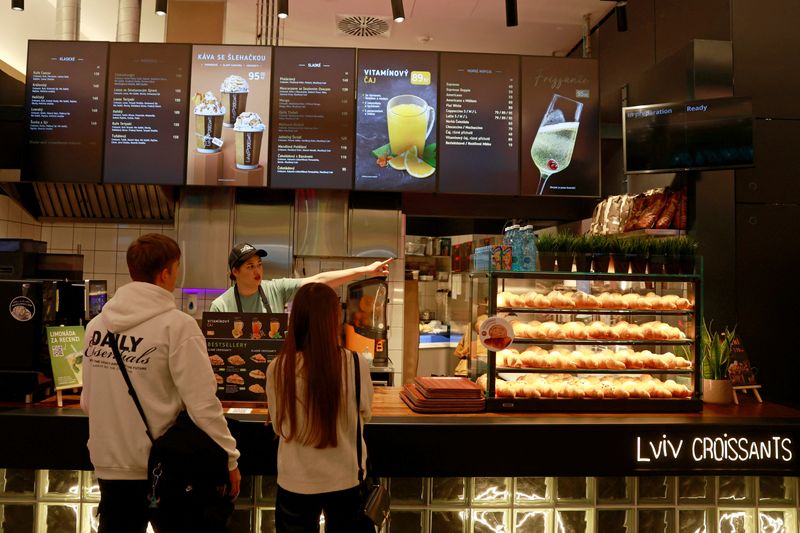
By Michael Kahn and Anna Koper
PRAGUE/WARSAW (Reuters) - Ukrainian businesses that set up or expanded in central Europe after Russia's 2022 invasion are shifting their focus from mainly refugee to local customers as they become more established, with some now eyeing a move further west.
As the war closed off opportunities at home and to the east, including Russia, Ukrainian-owned businesses sprang up in neighbouring countries, initially targeting their displaced compatriots with food, drink and services.
In Poland, which has a Ukrainian population swelled by the war to more than 1.5 million at current estimates, Ukrainians opened every tenth new business in 2024, according to Polish business associations and economists.
Andrii Halytskyi's Lviv Croissants now has 12 shops in Poland after launching there two years ago. It opened its first Czech outlet in October, part of what its founder says is a strategy to build a geographically diverse business by expanding westward and beyond the diaspora.
"While the Ukrainian refugee community in Europe is significant, relying solely on this customer base is not a sustainable long-term strategy," Halytskyi told Reuters.
Strong cultural similarities with Ukraine have helped make Poland a natural base for Ukrainian businesses. But many are also looking beyond emerging Europe's largest economy to a much bigger pool of customers.
"Companies initially view Poland as a bridge or springboard to European Union markets," said Dariusz Szymczycha, first vice president of the Polish-Ukrainian Chamber of Commerce.
"They want to learn ... the reality, standards, regulations and rules of operating in the European Union."
The Piana Vyshnia chain of bars is themed around a traditional cherry liqueur from Ukraine but sees local customers as its main target, founder Andriy Khudo told Reuters.
His !FЕST restaurant group has grown the brand - known as Drunken Cherry in English - to 15 locations in Poland and nine in other Baltic and eastern European countries, ramping up westward expansion since February 2022, Khudo said.
The group plans to open in Germany, Switzerland and France in 2025 and relaunch a venue in London, he said, adding that the bars are attracting new customers and are profitable.
"Before the war we focused on Ukraine because our business was developing there so quickly. But the war kicked us to look more west because of the risk in Ukraine," Khudo said.
REFUGEE BOOST
Although Ukraine's economy grew in 2023 and is likely to expand in 2024, Economy Minister Yulia Svyrydenko told Reuters in November it was still only at 78% of its size before Russia's full-scale invasion in February 2022.
With no end to the conflict in sight, businesses like Khudo's have had to look elsewhere - an economic flip for nearby countries which have also seen labour market strains eased by the arrival of Ukrainian workers.
A Deloitte report in March 2024 estimated that refugees from Ukraine would add up to 1.1 percent to Poland's GDP in 2023 and as much as 1.35 percent longer-term.
"When they come to Poland, for example, whether to work or set up businesses, this is an additional stimulus from the economic perspective for consumption and improving the supply of labour," Andrzej Kubisiak, deputy director of the Polish Economic Institute, told Reuters.
Another Ukrainian restaurateur, Olga Kopylova, told Reuters she had no plans before the war to take her Chornomorka brand abroad but now has three outlets named Czarnomorka in Poland and two apiece in Bratislava and Vienna.
Coffee chain Aroma Kava moved to Poland in 2022 and has since expanded to 10 locations, while Ukrainian ice cream and frozen products maker Three Bears bought Polish company Nordis.
Poland is now the second most important market for digital entertainment provider MEGOGO which has grown by appealing to local residents, mainly through family programming, co-founder Volodymyr Borovyk told Reuters. It entered Poland and Romania - emerging Europe's two most populous countries - in 2023.
"The healthy Polish market not only motivates us but also encourages other Ukrainian companies to enter this market with products tailored specifically for Polish consumers," he said.
At the newly-opened Lviv Croissants branch in Prague, the staff served a mix of tourists, locals and Ukrainians who sipped coffees and nibbled on sandwiches as they took a break from the holiday rush.
"This was my first time eating here, but for me it is like a feeling of home," 20-year old Ukrainian student Tatiana Melnyk said.
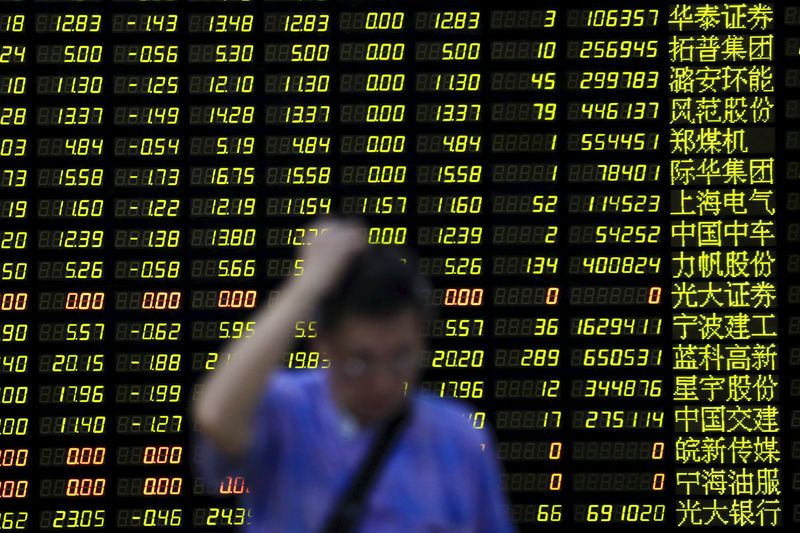
Investing.com-- Most Asian stocks rose on Tuesday as regional technology stocks tracked overnight gains on Wall Street, while Chinese markets lagged after the U.S. added two major tech companies to a blacklist.
Regional markets took positive cues from a strong overnight session on Wall Street, as technology stocks rebounded from a weak start to the year. Artificial intelligence darling NVIDIA Corporation (NASDAQ:NVDA) was a standout performer, hitting a record high in anticipation of an address by CEO Jensen Huang at the Consumer Electronics Show in Las Vegas.
U.S. stock index futures were mildly positive in Asian trade, with focus remaining on key nonfarm payrolls data due later in the week.
But despite Tuesday’s gains, most Asian markets were still nursing a weak start to 2025, amid persistent concerns over U.S. interest rates remaining high for longer.
Asia tech stocks track US gains; Nvidia in focus
Tech-heavy bourses were the best performers in Asia on Tuesday, with Japan’s Nikkei 225 index surging 2.4%, while South Korea’s KOSPI added 0.9%.
Japan’s TOPIX index rose 1%.
Tech stocks surged tracking their U.S. peers, which were buoyed by a mix of hype over artificial intelligence, as well as some bargain buying after clocking losses through December.
Nvidia’s Huang is widely expected to provide more details on the firm’s upcoming Blackwell AI chips, while any comments on AI demand will also be closely watched.
AI has been a key point of support for the tech sector over the past year, with chipmakers benefiting from increased capital expenditure on the sector, while software firms raced to provide their own AI offerings.
Chinese stocks lag after Tencent, CATL added to US blacklist
China’s Shanghai Shenzhen CSI 300 and Shanghai Composite indexes moved in a tight range, while Hong Kong’s Hang Sengg fell 0.5%.
The Hang Seng was weighed chiefly by losses in internet giant Tencent Holdings Ltd (HK:0700) and Tesla (NASDAQ:TSLA) battery supplier Contemporary Amperex Technology Co Ltd (SZ:300750), which both lost over 5%.
The two firms were added to a U.S. blacklist of companies with ties to the Chinese military. While inclusion in the blacklist does not entail any direct restrictions on the firms, it provides hurdles in doing business with U.S. companies- which represent a major market for both Tencent and CATL.
The new blacklist additions also raised concerns over souring trade ties between the world’s biggest economies, which are set to worsen amid increased trade tariffs under incoming U.S. President Donald Trump.
Trump on Monday denied reports that his administration will impose less strict trade tariffs than initially signaled.
A resurgent trade war bodes poorly for China and other Asian economies.
Broader Asian markets were mostly positive. Australia’s ASX 200 added 0.2%, while Singapore’s Straits Times index rose 0.1%.
Futures for India’s Nifty 50 index pointed to a mildly positive open, after the index plummeted 1.6% on Monday. Weak earnings from index heavyweights HDFC Bank Ltd (NS:HDBK) and Dabur India Ltd. (NS:DABU) eroded sentiment, especially ahead of more earnings from major Indian firms, which are due in the coming days.
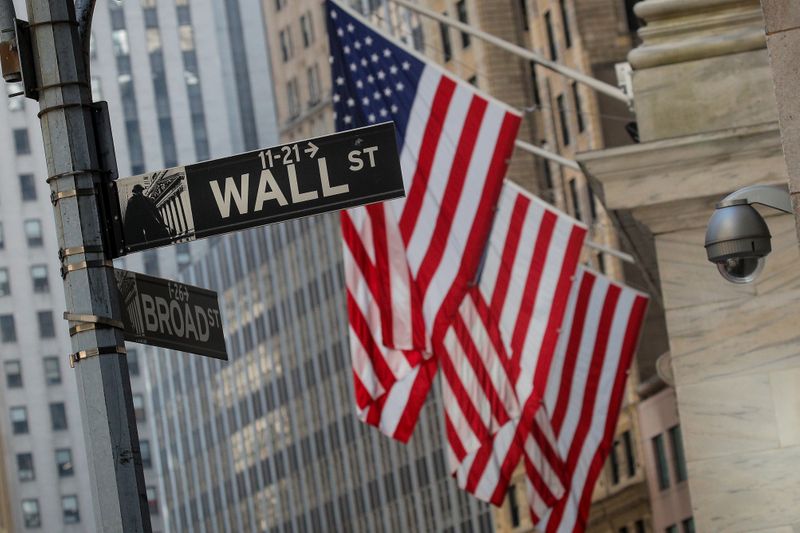
Investing.com-- U.S. stock index futures rose on Monday evening after a rally in technology shares boosted Wall Street indexes, with focus now turning to an upcoming address by Nvidia CEO Jensen Huang.
Futures were upbeat after gains in tech stocks helped Wall Street somewhat recover from a sluggish start to the new year. Nvidia also hit a record high in anticipation of Huang’s address.
S&P 500 Futures rose 0.1% to 6,028.75 points, while Nasdaq 100 Futures rose 0.2% to 21,782.25 points by 18:17 ET (23:17 GMT). Dow Jones Futures rose 0.1% to 43,021.0 points.
Nvidia hits record high ahead of Huang speech
NVIDIA Corporation (NASDAQ:NVDA) rose 0.5% in aftermarket trade following a 3.4% rally during Monday’s session, where the stock also briefly hit a record high of $152.15.
Focus was squarely on an upcoming address by CEO Jensen Huang at the Consumer Electronics Show in Las Vegas, due at 18:30 PT (02:30 GMT).
Anticipation of Huang’s address helped Nvidia’s shares break out of a trading range seen for a bulk of late-2025, as investors awaited more potential insight into the company’s upcoming Blackwell artificial intelligence chips.
Huang is also expected to announce Nvidia’s next-generation line of PCE gaming cards.
Nvidia gained around $2 trillion in market capitalization through 2024, as the company further cemented its position as the premiere maker of advanced AI chips.
The company also acts as a bellwether for the broader tech sector, given its prevalence in the fast-growing AI industry.
Trump comments temper optimism
Beyond tech, gains in stock markets were somewhat tempered by U.S. President-elect Donald Trump denying media reports that his administration will pursue a less aggressive tariff regime than previously feared.
Trump denied a Washington Post report that his administration will only target certain sectors in imposing trade tariffs, instead of the broad tariffs promised by Trump during his campaigning.
Uncertainty over Trump’s policies had also weighed on Wall Street in the beginning of the year, given that he is widely expected to enact expansionary and protectionist policies that could underpin inflation and disrupt global trade.
Tech buoys Wall St after weak start to 2025
Wall Street indexes were buoyed by a broader rally in tech stocks on Monday, which helped them recoup some of their losses from late-December and early-January.
Tech giants such as Microsoft Corporation (NASDAQ:MSFT), Amazon.com Inc (NASDAQ:AMZN), Meta Platforms Inc (NASDAQ:META) and Alphabet Inc (NASDAQ:GOOGL) surged between 1% and 5%, and were mostly upbeat in afterhours trade.
The S&P 500 rose 0.6% to 5,976.90 points on Monday, while the NASDAQ Composite surged 1.3% to 19,867.81 points. The Dow Jones Industrial Average lagged, falling less than 0.1% to 42,706.56 points.
But Wall Street indexes were still nursing losses amid persistent anxiety over a slower pace of interest rate cuts in 2025, amid sticky inflation and labor market strength.
Nonfarm payrolls data due this Friday is set to offer more cues.
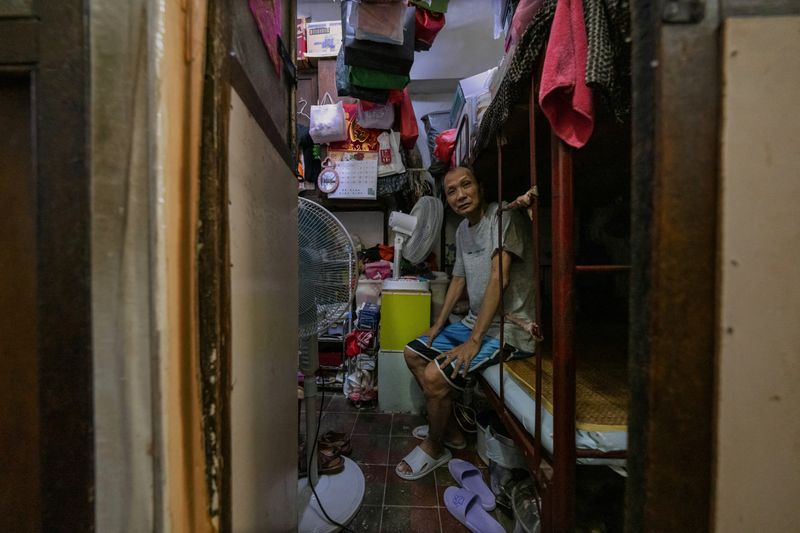
HONG KONG (Reuters) - Housing is famously cramped in the Asian financial hub of Hong Kong, thanks to sky-high property prices, but a single toilet and kitchen shared by four families would make for a challenging home situation anywhere.
"It's so small here; it's really inconvenient to live in," said retired 60-year-old Xiao Bo, as she sat on her bed, eating home-made dumplings off a folding table in a tiny space adorned with pink wallpaper and a rack of colourful tote bags.
Single and opting to give only her first name, she said she had nothing but "painful" memories of the partitioned, cluttered walk-up where she has lived for three years, but could not afford a better flat.
(For photoessay, please click on )
More than 200,000 people in Hong Kong live in sub-divided flats like hers, often cloaked in a musty odour and plagued by bedbugs during sweltering summers.
The former British colony, ranked as the world's most unaffordable city for a 14th consecutive year by survey company Demographia, has one of the world's highest rates of inequality.
In October, Hong Kong vowed to adopt new laws setting minimum space and safety norms for sub-divided flats, where each resident lives in an area of about 65 sq ft (6 sq m) on average, or half the size of the parking space for a sedan.
"We just want to regulate ... so the market will be providing flats of what we think will be a reasonable and liveable standard," its leader, John Lee, said at the time.

